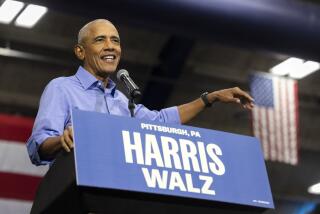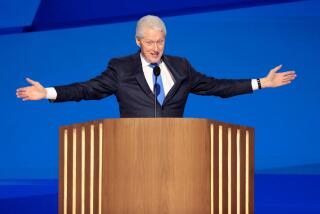Obama interview: ‘Maybe I could have done ... a little better’

President Barack Obama speaks about partisanship and race Feb. 10, 2016, with colleagues from his time in the Illinois Senate. (Brian Nguyen and Chris Walker/Chicago Tribune)
Reporting from Springfield, Ill. — He had just given an hourlong speech calling for comity in politics, and President Obama craved a few moments with a few friends who remember when he was not a polarizing figure but an effectively bipartisan one – his poker buddies from his eight years here in the Illinois Senate.
The three retired state senators, two Democrats and a Republican, were still laughing about Obama’s warmly received address to the Illinois General Assembly when he joined them for an interview Wednesday with the Los Angeles Times about the legislative gridlock in Washington and his role in it.
In a free-wheeling exchange, Obama said he doesn’t think that his race explains the Republican fortress against his agenda, or that having lawmakers over for drinks or to watch football every weekend would have made a difference over the last seven years.
But he also admitted that he was partly to blame for the hyperpartisan environment by failing to reach out more to Republicans.
“There is no doubt that every step of the way, every day that I’m in that office, maybe I could have done that a little better,” he said.
When one of his former mentors suggested Obama’s race has hampered his ability to push his political agenda, the president noted that the issue cut both ways, drawing some voters to his side and keeping others away.
“There’s no doubt there are pockets of the country where some dog whistles blow and there’s underlying racial fears that may be exploited,” he said.
“You’ve got a whole generation of kids growing up where the first president they’ve known is an African American,” he added. “Even if they’re hearing their parents say he’s terrible, it kind of seeps in that it’s not a crazy thing. So that sometime later, if there’s a Hispanic, or a woman or another African American, that won’t seem as exceptional. These things change over time.”
As he enters his last year in office, Obama said he hopes he has created “a tone for the next president” that is less strident than the political rhetoric on the campaign trail.
He said he believes history will treat him, and his legacy, more kindly than it might appear while he’s battling with Congress and a host of foreign crises.
Obama laughed and talked for almost an hour with his old friends, reminiscing about the days when he was hazed as a freshman senator who would joke that his name was Irish if it would help get votes.
Larry Walsh, hair shock-white against his Ash Wednesday ashes, greeted Obama with a big bear hug and a loud “Barack!”
Kirk Dillard, the Republican who might have been governor if not for the flattering things he said about Obama in 2008, shook his hand heartily.
Denny Jacobs, the rural Democrat who proudly mourns the days of “the backroom deal,” pulled up a wooden chair closest to the president and got right down to business.
“Listen,” he said. “We’ve got to figure out a way to get back what we had, people trying to get things done together.”
The three were well ensconced when Obama showed up in Springfield in 1997 and they welcomed him into their group – losing money to him in a weekly card game and then earning it back at Panther Creek golf course.
Join the conversation on Facebook >>
Dillard was more of a supper buddy, not part of the card group, but the moderate suburban Republican quickly gravitated to the Harvard-educated lawyer who could draft legislative language with just a pen and yellow legal pad.
He killed Obama’s healthcare bills with a two-word death knell, “socialized medicine.”
Still, they worked together to pass state campaign finance and death penalty reform, significant measures that earned Obama a reputation for being able to work across party lines.
These days, Republicans here rarely break lockstep with the GOP governor, Bruce Rauner, and Democrats keep tight ranks with the leadership in the House and Senate.
The polarization was on full display Wednesday in the State Capitol building, where Obama returned for the first time since 2009 to see the new Lincoln Library.
During Obama’s address, Democrats loudly cheered and stood for his policy suggestions. Republicans mostly sat quietly and smiled, State of the Union style, though a few grayer heads nodded at his stories of the old days.
At the Hoogland Center for the Arts an hour later, Obama hurried through a crowd and got to the small gallery room early.
You should’ve had the legislature over for beers, Walsh told him. Obamacare was a mistake, a thuggish move that turned everyone against him, said Dillard.
But Jacobs said he thinks the wall was built before Obama even hung his clothes in the closet at the White House.
“They were afraid of you for a couple of reasons. Number one, you were black,” said Jacobs, a white man in his 70s.
Obama smiled big, and moderated his blunt-talking friend’s suggestion.
“I have no doubt there are people who voted against me because of race … or didn’t approve of my agenda because of race,” he said. “I also suspect there are a bunch of people who are excited or voted for me because of the notion of the first African American president … Those things cut both ways.”
Jacobs knows what he knows. “That’s what they were afraid of, Mr. President,” he said.
Dillard blames the way Democrats jammed Obamacare through without a single Republican vote.
Obama agreed. “Muscle move,” he said, but protested that Republicans made clear they were determined to block his initiatives.
He was on his way to meet GOP leaders to talk about stimulating an economy on the brink of depression, he recalled, when he got a press release from them denouncing the plan.
If “there’s nothing to talk about,” he said, “I just have to act.”
Jacobs harrumphed, agreeing.
Bill and Hillary Clinton didn’t face race as a barrier when they tried to pass healthcare reform, Obama pointed out. “They got beat up just as good, and they didn’t even get the thing done.”
Still, they labored over the idea that the partisanship may be here to stay.
Obama has policy proposals he thinks can chip away at the problem. Get big money out of politics. Give more people access to the ballot box. And stop the overly political method of drawing congressional districts.
They ended their session wondering if Obama can again be the unifying figure who first drew national attention at the 2004 Democratic National Convention, when he declared that America is not made up of red states or blue states, but the United States.
His friends think he can do so during his presidency. Obama thinks it may come later.
“Some of our most revered presidents were hugely polarizing. People cussed em, called them everything but a child of God,” he said. “I suspect that when I’m done being president, suddenly people will start saying, ‘Oh, you know that guy, he wasn’t a bad guy.’”
Follow me for news about the White House @cparsons.
ALSO
Nevada rancher Cliven Bundy arrested as holdouts in Oregon standoff say they will surrender
Federal program that issues smartphones to new immigrants raises questions
Black votes matter in Democratic presidential race as campaigns shift to more diverse states
More to Read
The complete guide to home viewing
Get Screen Gab for everything about the TV shows and streaming movies everyone’s talking about.
You may occasionally receive promotional content from the Los Angeles Times.







